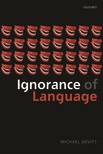 Ignorance of Language
Ignorance of Language
Contents
-
-
-
-
-
-
-
-
-
-
-
-
-
11.1 Introduction 11.1 Introduction
-
11.2 “The Only Theory in Town” 11.2 “The Only Theory in Town”
-
11.3 Background on Linguistic Competence 11.3 Background on Linguistic Competence
-
11.4 Implausibility of Represented Rules in Linguistic Competence 11.4 Implausibility of Represented Rules in Linguistic Competence
-
11.5 Psychology of Skills 11.5 Psychology of Skills
-
11.6 Brute–Causal Processing 11.6 Brute–Causal Processing
-
11.7 Psychology of Language Production 11.7 Psychology of Language Production
-
11.8 Psychology of Language Comprehension 11.8 Psychology of Language Comprehension
-
11.9 Conclusion 11.9 Conclusion
-
-
-
-
-
Cite
Abstract
This chapter argues that language use does not provide persuasive evidence for the Representational Thesis (RT) view of linguistic competence, and that RT is implausible. RT is not supported by the apparently popular “only-theory-in-town” abduction, nor it is supported by the psychology of skills in general, an appropriate place to look because linguistic competence appears to be procedural (implicit) knowledge acquired by implicit learning. The chapter also argues for some tentative proposals: that language processing is not governed by the unrepresented structure rules of the language; that language processing does not involve metalinguistic representations of the syntactic and semantic properties of linguistic expressions, but rather is a fairly brute-causal associationist process; and that if the Language-of-Thought Hypothesis (LOTH) is false, then the rules of a language are not, in a robust way, psychologically real in a speaker.
Sign in
Personal account
- Sign in with email/username & password
- Get email alerts
- Save searches
- Purchase content
- Activate your purchase/trial code
- Add your ORCID iD
Purchase
Our books are available by subscription or purchase to libraries and institutions.
Purchasing information| Month: | Total Views: |
|---|---|
| October 2022 | 1 |
| November 2022 | 2 |
| January 2023 | 1 |
| April 2023 | 2 |
| August 2023 | 1 |
| November 2023 | 1 |
| March 2024 | 1 |
| May 2024 | 3 |
| June 2024 | 6 |
| November 2024 | 1 |
| December 2024 | 3 |

Get help with access
Institutional access
Access to content on Oxford Academic is often provided through institutional subscriptions and purchases. If you are a member of an institution with an active account, you may be able to access content in one of the following ways:
IP based access
Typically, access is provided across an institutional network to a range of IP addresses. This authentication occurs automatically, and it is not possible to sign out of an IP authenticated account.
Sign in through your institution
Choose this option to get remote access when outside your institution. Shibboleth/Open Athens technology is used to provide single sign-on between your institution’s website and Oxford Academic.
If your institution is not listed or you cannot sign in to your institution’s website, please contact your librarian or administrator.
Sign in with a library card
Enter your library card number to sign in. If you cannot sign in, please contact your librarian.
Society Members
Society member access to a journal is achieved in one of the following ways:
Sign in through society site
Many societies offer single sign-on between the society website and Oxford Academic. If you see ‘Sign in through society site’ in the sign in pane within a journal:
If you do not have a society account or have forgotten your username or password, please contact your society.
Sign in using a personal account
Some societies use Oxford Academic personal accounts to provide access to their members. See below.
Personal account
A personal account can be used to get email alerts, save searches, purchase content, and activate subscriptions.
Some societies use Oxford Academic personal accounts to provide access to their members.
Viewing your signed in accounts
Click the account icon in the top right to:
Signed in but can't access content
Oxford Academic is home to a wide variety of products. The institutional subscription may not cover the content that you are trying to access. If you believe you should have access to that content, please contact your librarian.
Institutional account management
For librarians and administrators, your personal account also provides access to institutional account management. Here you will find options to view and activate subscriptions, manage institutional settings and access options, access usage statistics, and more.